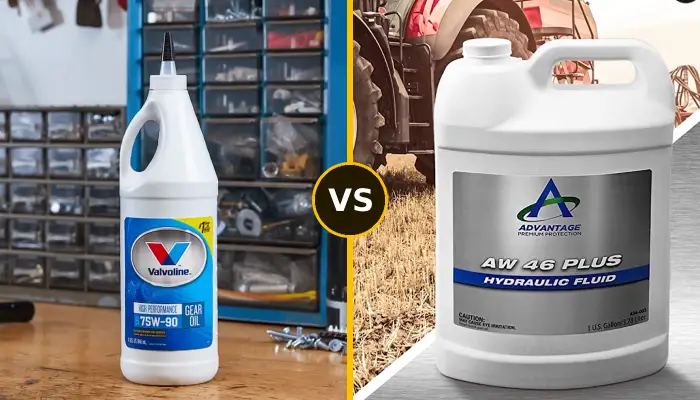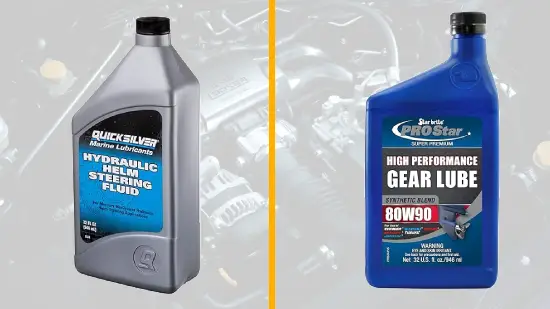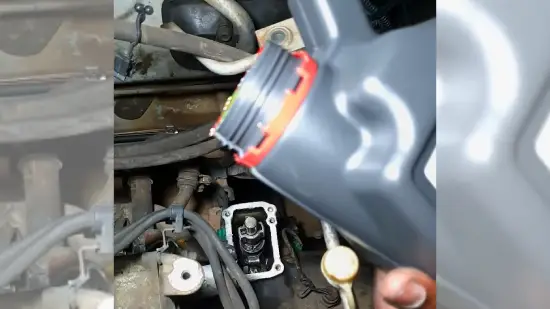Physical Address
304 North Cardinal St.
Dorchester Center, MA 02124
Physical Address
304 North Cardinal St.
Dorchester Center, MA 02124

The distinction between gear oil and hydraulic oil is critical for maintaining the efficiency and longevity of vehicles and machinery. These two specialized lubricants serve distinct purposes in automotive and industrial applications.
Gear oil is designed to protect and lubricate gears and bearings, ensuring smooth operation and guarding against wear and heat damage. In contrast, hydraulic oil facilitates power transmission and lubrication within hydraulic systems, ensuring energy savings and extending the life of machinery.
In this discussion, we will explore the key differences between gear oil and hydraulic oil. Shedding light on their respective properties & applications and choosing the right one for specific vehicle and machinery needs is essential.

Regarding gear oil and hydraulic oil for vehicles, there are several key differences to consider. Understanding these differences is essential for selecting the right oil for specific vehicle applications.
The viscosity of gear oil is typically higher than that of hydraulic oil. This is because gear systems in vehicles experience high pressures and loads, requiring thicker oil to withstand the forces. Gear oil is available in different grades, such as 80W90 or 85W140, indicating its viscosity at different temperatures.
On the other hand, hydraulic oil has lower viscosity to ensure smooth fluid flow in hydraulic systems. The grades of hydraulic oil can vary depending on the specific requirements of the hydraulic system.
Gear oil is formulated with extreme pressure additives that provide superior wear protection. These additives create a protective film on the gear surfaces, reducing friction and preventing metal-to-metal contact. This is crucial for the smooth operation and longevity of the vehicle’s gears.
In contrast, hydraulic oil contains additives such as anti-wear, anti-foam, and oxidation-resistant agents. These additives are designed to enhance the lubrication and cooling properties required for the vehicle’s hydraulic components.
The anti-wear additives prevent wear, while the anti-foam additives prevent foam formation, which can result in reduced performance and damage. Oxidation-resistant agents keep the oil from deteriorating under high temperatures, so the system lasts a long time and is reliable.
Gear oil is primarily used in vehicle transmissions, manual gearboxes, and differentials. It serves the crucial function of protecting the internal components from wear and reducing friction between the gears. This helps ensure smooth gear shifting and optimal transmission system performance.
In contrast, hydraulic oil is exclusively used in hydraulic systems found in vehicles. These systems rely on transferring power through hydraulic fluid to perform various functions, such as operating power steering, brakes, and suspension systems.
Hydraulic oil also acts as a coolant, dissipating heat generated during operation, which helps maintain the hydraulic equipment’s efficiency and reliability.
Gear oil is typically heavier and thicker than hydraulic oil, making it better able to lubricate the metal components of a transmission system. The thicker consistency of gear oil allows it to adhere to gear surfaces, forming a protective film that reduces friction and wear.
Alternatively, hydraulic oil is lighter and less viscous, allowing it to flow rapidly and efficiently in hydraulic systems. Its low viscosity makes hydraulic oil ideal for applications that require a smooth and responsive operation, such as vehicle steering and braking.
Typically, gear oil has to handle high pressures and heavy loads encountered in gear systems. It has a higher viscosity and contains additives that enhance its resistance to extreme pressure. This allows gear oil to maintain its lubricating properties and prevent metal-to-metal contact under high-stress conditions.
Then again, hydraulic oil is formulated to meet the pressure and load demands of hydraulic systems. It has a lower viscosity to ensure smooth flow through the system while still providing sufficient lubrication.
Hydraulic oil also contains additives that protect against wear and corrosion, ensuring the efficient operation of hydraulic components.
Regarding compressibility, gear oil and hydraulic oil for vehicles have distinct differences.
Hydraulic oil is specifically designed to be non-compressible, meaning it doesn’t easily change in volume when subjected to pressure. This characteristic is crucial in hydraulic systems, as it allows for precise control and movement.
The non-compressibility of hydraulic oil ensures that power is efficiently transmitted throughout the system without any loss due to compression.
Conversely, gear oil doesn’t require the same non-compressibility characteristics. Its primary function is to reduce friction and protect gear components rather than transmit power. Therefore, while gear oil may have some level of compressibility, it isn’t a significant factor in its performance.
To ensure optimal performance and longevity of your vehicle’s components, you must understand how gear oil and hydraulic oil ingress contaminants differently.
Hydraulic systems, being more susceptible to contamination, require hydraulic oil with superior filtration and anti-contaminant properties. Contaminants in hydraulic oil can cause damage to sensitive components, such as valves and pumps, leading to reduced efficiency and potential system failures.
On the other hand, gear systems have a lower tolerance for contamination and may not demand the same level of filtration. While gear oil should still be kept clean, it generally poses a lower risk of contamination-related issues. It provides lubrication and protection to the gears.
You need to consider the operating speed and precision requirements when choosing between gear oil and hydraulic oil for your vehicle.
Gear oil is specifically formulated to meet the demands of high-speed gear operations, where precision and smooth motion are crucial.
It provides excellent lubrication and heat dissipation properties to ensure optimal performance. Gear systems require precise movements and accurate synchronization, making gear oil the ideal choice for these applications.
Alternatively, hydraulic oil is designed for power transmission in hydraulic systems, where speed and precision may not be as critical as in gear systems. Hydraulic systems operate at lower speeds and typically involve the transfer of power rather than precise movements.
Therefore, hydraulic oil is better suited for applications that prioritize power transmission over precision.
In hydraulic systems, the ability to resist emulsification with water is crucial. This means that the oil should be able to maintain its effectiveness even in the presence of moisture. Hydraulic oil is designed to resist emulsification, ensuring that it can separate from the water and continue to provide lubrication and protection.
Additionally, gear oil may not have the same level of emulsification resistance as hydraulic oil. Gear oil is typically not exposed to the same conditions as hydraulic oil and therefore may not be formulated to resist emulsification with water to the same degree.

The amount of gear oil needed for your vehicle depends on its make and model. For normal cars and light commercial vehicles, it’s typically somewhere between 1.5 and 2.5L.
However, it’s important to note that some vehicles may require a specific type of gear oil, such as engine oil or even automatic transmission fluid (AT fluid).
The amount of hydraulic oil required for your car can vary depending on the make and model, as well as the specific hydraulic system in question.
Generally, vehicles require relatively small quantities of hydraulic fluid, typically 0.5 to 2 quarts (approximately 0.5 to 2 liters) of hydraulic oil.
It’s important to consult your vehicle’s owner’s manual or contact the manufacturer to determine the exact amount of hydraulic oil needed for your specific car.
Using hydraulic oil instead of gear oil isn’t recommended for vehicles. Gear oil and hydraulic oil have different properties and are specifically formulated for their respective applications. Hydraulic oil doesn’t have the same level of wear protection as gear oil and may not provide sufficient lubrication to the gear teeth.
When gear oil is mixed with hydraulic oil, it can significantly compromise the performance and functionality of your vehicle’s lubrication system. Mixing these oils can lead to a dilution of the desired properties and the formation of unwanted byproducts.
Hydraulic and gear oil viscosities can also affect how well the lubrication system creates a protective film on metal surfaces, which can increase friction and wear. Moreover, additive packages in different oils may interact unexpectedly, reducing lubrication effectiveness and causing corrosion on component surfaces.
Understanding the differences between gear oil and hydraulic oil is crucial for maintaining the performance and longevity of your vehicle. While both oils serve specific purposes, they aren’t interchangeable.
Mixing gear oil with hydraulic oil can lead to severe damage to your vehicle’s components. Therefore, it’s essential to consult your vehicle’s manual and use the recommended oil to ensure optimal performance and avoid costly repairs.
Making an informed choice in this regard ensures not only smooth operations but also the extended life of valuable machinery and vehicles.
Last update on 2025-07-02 / Affiliate links / Images from Amazon Product Advertising API